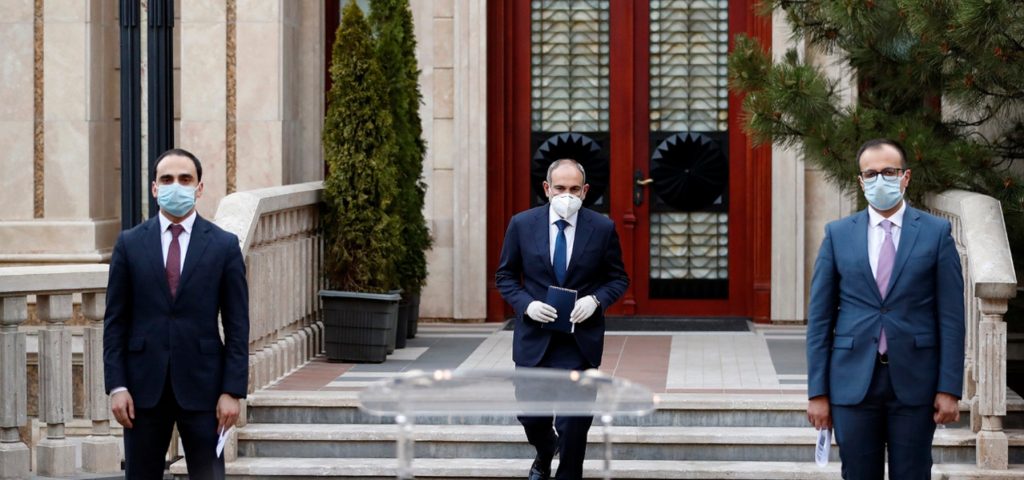Armenian PM gives briefing after announcing coronavirus infection
On the first of June, on his birthday, the Prime Minister of Armenia Nikol Pashinyan himself announced during a Facebook live broadcast that he has contracted coronavirus. A few hours later, he participated in an online briefing on the situation in the country and measures to combat the coronavirus.
The briefing took place immediately after the commandant’s meeting, which this time took place online.
Together with Pashinyan, the commandant, Deputy Prime Minister Tigran Avinyan and Minister of Health Arsen Torosyan reported on the situation.
All participants in the briefing were masked and observed social distancing measures.
- Sharp jump in coronavirus cases in Armenia as public transport and daycares reopen
- Coronavirus politics: why has Armenia become the regional leader in coronavirus deaths?
No strict quarantine measures expected
The prime minister said that he measured his temperature before the briefing and that it was within normal limits, and that from June 2 he intends to return to his normal work rhythm, since he does not feel unwell.
Pashinyan emphasized that he did not have any symptoms of the disease even before taking the test. It was a usual check before a planned trip to Nagorno-Karabakh. He estimated there may be as many as 20,000 people in the country who have the disease asymptomatically.
“That is, they, like me, are unaware of the presence of infection.”
Answering a question whether the country would return to strict restrictions, Pashinyan said:
“As long as there is an opportunity not to return to strict restrictions, that is, to total closures, we will go this way.”
And the country is now on the path to monitoring compliance with new rules of conduct and work standards for various areas of activity that the commandant has developed. Police make sure that residents wear masks and observe social distancing requirements. A special inspection body conducts unannounced inspections of various enterprises.
A state of emergency was declared in Armenia from March 16 and was twice extended, most recently until June 13. However, from the end of April, the process of weakening quarantine measures began, the restriction on movement was lifted on May 5, and from May 18, almost all business, transport, and even kindergartens started working.
Air borders open from mid-July
Tigran Avinyan, Deputy Prime Minister and Commander of PE, said that the government of Armenia has periodically changed its strategy over the past five months. The period of severe restrictions has changed the stage of work of enterprises. It was after this that a new outbreak began, the number of infected daily increases by hundreds.
“We expected this and were ready. However, a return to strict standards is a last resort for us. We closely monitor all the actions of foreign colleagues in order to apply their positive experience,” said the commandant.
Tigran Avinyan said that the first batch of coronavirus tests made in Armenia is already ready. And from June 2,350 tests will be sent to the laboratory for analysis.
According to him, one of the main topics of the last meeting of the commandant’s office was tourism:
“Around the middle of July, we are going to open the air borders of Armenia, observing all the rules and caution. We hope this will resolve the problems of the tourism industry. ”
About the condition of patients
Minister of Health Arsen Torosyan said that 440 people with coronavirus were found to be in serious condition:
“55 citizens are in critical condition, of which 16 are connected to ventilators.”
Arsen Torosyan once again emphasized that measures are being taken to increase places in intensive care units of various clinics. But for now, this is an urgent problem for the healthcare system.
Due to the sharp increase in the number of infected in Armenia, it was decided not to isolate people with asymptomatic coronavirus infection anymore.
The health of those infected at home is monitored by doctors from municipal clinics, rural outpatient clinics and health centers. The minister said that “retraining courses are being organized for them, since complaints are often heard that the employees of polyclinics have poor skills in managing the disease at home.”




















